October 2018
It’s Wise To Treat Gout Early
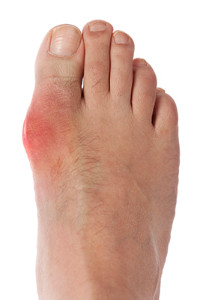 The painful condition that is known as gout may lead to future medical conditions in the body if it is not treated promptly. Research has shown that is a result of excess uric acid in the blood levels, which crystalize in the joints of the body. It most often occurs in the big toe, although you may notice symptoms of this uncomfortable condition elsewhere in the body. If certain foods are ingested, gout may develop as the uric acid levels rise. These may include eating an overabundance of shellfish, alcohol, or organ meats, such as liver, sweetbreads, or kidneys. There may be preventative measures that can be taken to avoid gout, which may include adapting specific lifestyle habits. If smoking is part of your daily routine, it may be wise to start cessation. Additionally, adopting a gentle exercise program may aid in preventing the occurrence of gout. If you are afflicted with this condition, it’s suggested to consult with a podiatrist who can properly treat gout.
The painful condition that is known as gout may lead to future medical conditions in the body if it is not treated promptly. Research has shown that is a result of excess uric acid in the blood levels, which crystalize in the joints of the body. It most often occurs in the big toe, although you may notice symptoms of this uncomfortable condition elsewhere in the body. If certain foods are ingested, gout may develop as the uric acid levels rise. These may include eating an overabundance of shellfish, alcohol, or organ meats, such as liver, sweetbreads, or kidneys. There may be preventative measures that can be taken to avoid gout, which may include adapting specific lifestyle habits. If smoking is part of your daily routine, it may be wise to start cessation. Additionally, adopting a gentle exercise program may aid in preventing the occurrence of gout. If you are afflicted with this condition, it’s suggested to consult with a podiatrist who can properly treat gout.
Gout is a painful condition that can be treated. If you are seeking treatment, contact Dr. Steven Schwartz from Pennsylvania. Our doctor will treat your foot and ankle needs.
What Is Gout?
Gout is a form of arthritis that is characterized by sudden, severe attacks of pain, redness, and tenderness in the joints. The condition usually affects the joint at the base of the big toe. A gout attack can occur at any random time, such as the middle of the night while you are asleep.
Symptoms
- Intense Joint Pain - Usually around the large joint of your big toe, and it most severe within the first four to twelve hours
- Lingering Discomfort - Joint discomfort may last from a few days to a few weeks
- Inflammation and Redness -Affected joints may become swollen, tender, warm and red
- Limited Range of Motion - May experience a decrease in joint mobility
Risk Factors
- Genetics - If family members have gout, you’re more likely to have it
- Medications - Diuretic medications can raise uric acid levels
- Gender/Age - Gout is more common in men until the age of 60. It is believed that estrogen protects women until that point
- Diet - Eating red meat and shellfish increases your risk
- Alcohol - Having more than two alcoholic drinks per day increases your risk
- Obesity - Obese people are at a higher risk for gout
Prior to visiting your podiatrist to receive treatment for gout, there are a few things you should do beforehand. If you have gout you should write down your symptoms--including when they started and how often you experience them, important medical information you may have, and any questions you may have. Writing down these three things will help your podiatrist in assessing your specific situation so that he or she may provide the best route of treatment for you.
If you have any questions, please feel free to contact our offices located in Chambersburg, and Mcconnellsburg, PA . We offer the newest diagnostic and treatment technologies for all your foot care needs.
Causes of Foot Blisters
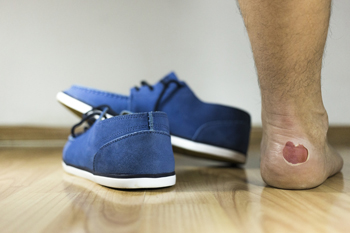 If you’ve ever had a blister on your foot, you most likely may be aware of the discomfort that is often associated with it. It is known to occupy a small area on your foot, and is filled with a liquid that acts as a protective covering for the skin. The most common cause of foot blisters is friction, and this may be a result of wearing shoes and socks that are too tight. If the shoes that are worn, pinch the toes or heels, blisters may often form to protect the feet. There are additional ways for blisters to develop, and these may include having an allergic reaction, enduring frostbite or burns, or excessive moisture. If you have noticed blisters on your feet, it is advised to protect it by covering the blister with a bandage so the healing process can begin. If the blister should become infected, it’s suggested to speak with a podiatrist as quickly as possible to discuss the best treatments for you.
If you’ve ever had a blister on your foot, you most likely may be aware of the discomfort that is often associated with it. It is known to occupy a small area on your foot, and is filled with a liquid that acts as a protective covering for the skin. The most common cause of foot blisters is friction, and this may be a result of wearing shoes and socks that are too tight. If the shoes that are worn, pinch the toes or heels, blisters may often form to protect the feet. There are additional ways for blisters to develop, and these may include having an allergic reaction, enduring frostbite or burns, or excessive moisture. If you have noticed blisters on your feet, it is advised to protect it by covering the blister with a bandage so the healing process can begin. If the blister should become infected, it’s suggested to speak with a podiatrist as quickly as possible to discuss the best treatments for you.
Blisters may appear as a single bubble or in a cluster. They can cause a lot of pain and may be filled with pus, blood, or watery serum. If your feet are hurting, contact Dr. Steven Schwartz of Pennsylvania. Our doctor can provide the care you need to keep you pain-free and on your feet.
Foot Blisters
Foot blisters are often the result of friction. This happens due to the constant rubbing from shoes, which can lead to pain.
What Are Foot Blisters?
A foot blister is a small fluid-filled pocket that forms on the upper-most layer of the skin. Blisters are filled with clear fluid and can lead to blood drainage or pus if the area becomes infected.
Symptoms
(Blister symptoms may vary depending on what is causing them)
- Bubble of skin filled with fluid
- Redness
- Moderate to severe pain
- Itching
Prevention & Treatment
In order to prevent blisters, you should be sure to wear comfortable shoes with socks that cushion your feet and absorb sweat. Breaking a blister open may increase your chances of developing an infection. However, if your blister breaks, you should wash the area with soap and water immediately and then apply a bandage to the affected area. If your blisters cause severe pain it is important that you call your podiatrist right away.
If you have any questions, please feel free to contact our offices located in Chambersburg, and Mcconnellsburg, PA . We offer the newest diagnostic and treatment technologies for all your foot care needs.
Why is it Important for Seniors to Maintain Proper Foot Care?
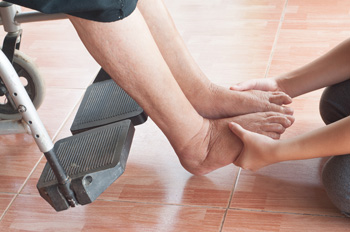 There are several ways seniors can practice proper foot care. These may include wearing shoes that fit correctly and are comfortable to wear during daily activities. It’s important the toes have adequate room to move around inside, and this may possibly avoid a pre-existing case of bunions from becoming worse. It may also prevent corns from developing. Additionally, performing a gentle exercise program frequently, may aid in keeping the blood flowing. These may include walking and stretching, which may help to maintain proper circulation. Washing the feet and drying thoroughly between the toes may be beneficial in preventing athlete’s foot from developing. When a moisturizing lotion is used, a painful condition referred to as cracked heels may be avoided. When the toenails are trimmed properly, occurrences of ingrown toenails may decrease. If you are a senior, it’s suggested to consult with a podiatrist on a frequent basis to discuss any foot conditions that may be present.
There are several ways seniors can practice proper foot care. These may include wearing shoes that fit correctly and are comfortable to wear during daily activities. It’s important the toes have adequate room to move around inside, and this may possibly avoid a pre-existing case of bunions from becoming worse. It may also prevent corns from developing. Additionally, performing a gentle exercise program frequently, may aid in keeping the blood flowing. These may include walking and stretching, which may help to maintain proper circulation. Washing the feet and drying thoroughly between the toes may be beneficial in preventing athlete’s foot from developing. When a moisturizing lotion is used, a painful condition referred to as cracked heels may be avoided. When the toenails are trimmed properly, occurrences of ingrown toenails may decrease. If you are a senior, it’s suggested to consult with a podiatrist on a frequent basis to discuss any foot conditions that may be present.
Proper foot care is something many older adults forget to consider. If you have any concerns about your feet and ankles, contact Dr. Steven Schwartz from Pennsylvania. Our doctor can provide the care you need to keep you pain-free and on your feet.
The Elderly and Their Feet
As we age we start to notice many changes in our body, but the elder population may not notice them right away. Medical conditions may prevent the elderly to take notice of their foot health right away. Poor vision is a lead contributor to not taking action for the elderly.
Common Conditions
- Neuropathy – can reduce feeling in the feet and can hide many life-threatening medical conditions.
- Reduced flexibility – prevents the ability of proper toenail trimming, and foot cleaning. If left untreated, it may lead to further medical issues.
- Foot sores – amongst the older population can be serious before they are discovered. Some of the problematic conditions they may face are:
- Gouging toenails affecting nearby toe
- Shoes that don’t fit properly
- Pressure sores
- Loss of circulation in legs & feet
- Edema & swelling of feet and ankles
Susceptible Infections
Diabetes and poor circulation can cause general loss of sensitivity over the years, turning a simple cut into a serious issue.
If you have any questions please feel free to contact our offices located in Chambersburg, and Mcconnellsburg, PA . We offer the newest diagnostic and treatment technologies for all your foot and ankle needs.
The Benefits of Using Orthotics
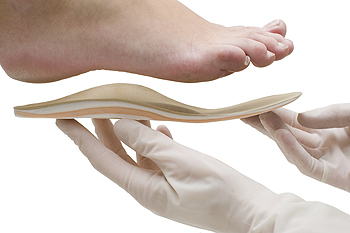 Many people have chosen to use orthotics in their shoes for the primary reason of relieving pain and discomfort that may be associated with certain foot conditions. There may be many beneficial reasons for using orthotics including maintaining proper arch support, relieving uncomfortable pressure the feet may endure from daily activities, and to aid in diminishing heel pain. Research has shown that body weight may be easier to balance on the feet when the proper orthotics are used. A common reason to use orthotics may be overpronation, which is the term referred to when the foot rolls too far inward. If left untreated, it may cause a plethora of additional foot ailments, including bunions, calluses, and plantar fasciitis, which is an inflammation of the tissue that runs along the sole of the foot. If you would like additional information about orthotics, please consult with a podiatrist who can properly measure your foot for these devices.
Many people have chosen to use orthotics in their shoes for the primary reason of relieving pain and discomfort that may be associated with certain foot conditions. There may be many beneficial reasons for using orthotics including maintaining proper arch support, relieving uncomfortable pressure the feet may endure from daily activities, and to aid in diminishing heel pain. Research has shown that body weight may be easier to balance on the feet when the proper orthotics are used. A common reason to use orthotics may be overpronation, which is the term referred to when the foot rolls too far inward. If left untreated, it may cause a plethora of additional foot ailments, including bunions, calluses, and plantar fasciitis, which is an inflammation of the tissue that runs along the sole of the foot. If you would like additional information about orthotics, please consult with a podiatrist who can properly measure your foot for these devices.
If you are having discomfort in your feet and would like to try orthotics, contact Dr. Steven Schwartz from Pennsylvania. Our doctor can provide the care you need to keep you pain-free and on your feet.
What Are Orthotics?
Orthotics are inserts you can place into your shoes to help with a variety of foot problems such as flat feet or foot pain. Orthotics provide relief and comfort for minor foot and heel pain but can’t correct serious biomechanical problems in your feet.
Over-the-Counter Inserts
Orthotics come in a wide variety of over-the-counter inserts that are used to treat foot pain, heel pain, and minor problems. For example, arch supports can be inserted into your shoes to help correct overarched or flat feet, while gel insoles are often used because they provide comfort and relief from foot and heel pain by alleviating pressure.
Prescription Orthotics
If over-the-counter inserts don’t work for you or if you have a more severe foot concern, it is possible to have your podiatrist prescribe custom orthotics. These high-quality inserts are designed to treat problems such as abnormal motion, plantar fasciitis, and severe forms of heel pain. They can even be used to help patients suffering from diabetes by treating foot ulcers and painful calluses and are usually molded to your feet individually, which allows them to provide full support and comfort.
If you are experiencing minor to severe foot or heel pain, it’s recommended to speak with your podiatrist about the possibilities of using orthotics. A podiatrist can determine which type of orthotic is right for you and allow you to take the first steps towards being pain-free.
If you have any questions please contact our offices located in Chambersburg, and Mcconnellsburg, PA . We offer the newest diagnostic and treatment technologies for all your foot and ankle needs.
Preventative Ways to Protect Diabetic Feet
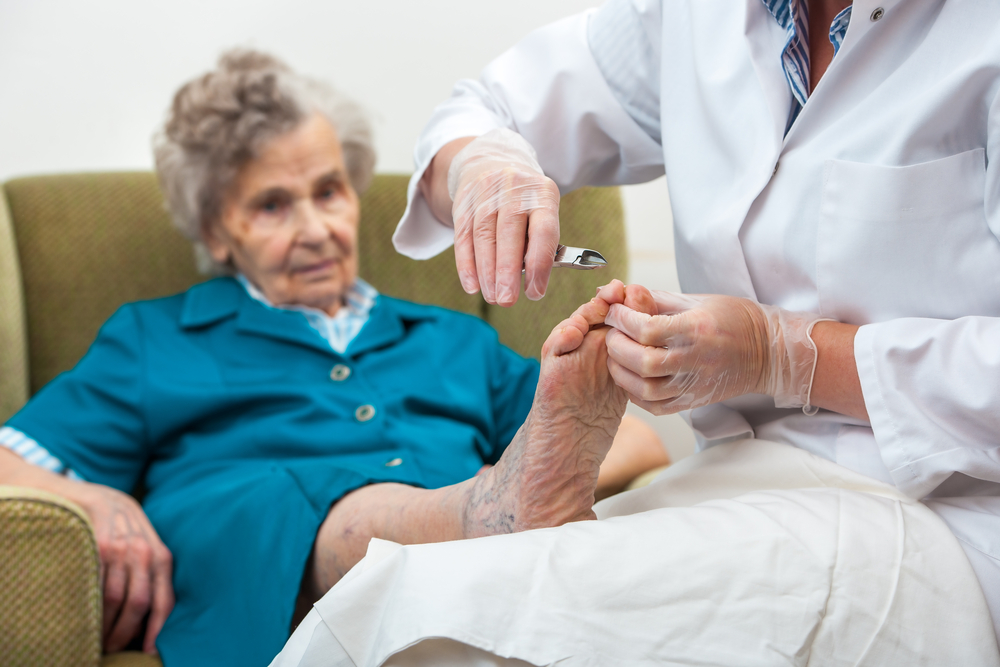 Patients who are diabetic often experience conditions involving the feet. These may include corns, blisters, and foot ulcers, which may typically be a result of elevated blood sugar levels. Many patients experience a tingling sensation and this may prevent cuts, sores, and bruises from being noticed. There are several preventative measures to ensure the feet can feel good. These generally include inspecting the feet daily for any type of cuts or wounds, maintaining dry feet to reduce the possibility of infection, and always wearing shoes or having your feet covered while inside or outside. Additionally, if smoking is part of the patients daily routine, research has shown it is advised to quit, and this may improve circulation in the feet. If you are diabetic, it’s suggested to have your feet checked regularly by a podiatrist who will be able to properly treat any foot conditions related to diabetes.
Patients who are diabetic often experience conditions involving the feet. These may include corns, blisters, and foot ulcers, which may typically be a result of elevated blood sugar levels. Many patients experience a tingling sensation and this may prevent cuts, sores, and bruises from being noticed. There are several preventative measures to ensure the feet can feel good. These generally include inspecting the feet daily for any type of cuts or wounds, maintaining dry feet to reduce the possibility of infection, and always wearing shoes or having your feet covered while inside or outside. Additionally, if smoking is part of the patients daily routine, research has shown it is advised to quit, and this may improve circulation in the feet. If you are diabetic, it’s suggested to have your feet checked regularly by a podiatrist who will be able to properly treat any foot conditions related to diabetes.
Diabetic foot care is important in preventing foot ailments such as ulcers. If you are suffering from diabetes or have any other concerns about your feet, contact Dr. Steven Schwartz from Pennsylvania. Our doctor can provide the care you need to keep you pain-free and on your feet.
Diabetic Foot Care
Diabetes affects millions of people every year. The condition can damage blood vessels in many parts of the body, especially the feet. Because of this, taking care of your feet is essential if you have diabetes, and having a podiatrist help monitor your foot health is highly recommended.
The Importance of Caring for Your Feet
- Routinely inspect your feet for bruises or sores.
- Wear socks that fit your feet comfortably.
- Wear comfortable shoes that provide adequate support.
Patients with diabetes should have their doctor monitor their blood levels, as blood sugar levels play such a huge role in diabetic care. Monitoring these levels on a regular basis is highly advised.
It is always best to inform your healthcare professional of any concerns you may have regarding your feet, especially for diabetic patients. Early treatment and routine foot examinations are keys to maintaining proper health, especially because severe complications can arise if proper treatment is not applied.
If you have any questions please feel free to contact our offices located in Chambersburg, and Mcconnellsburg, PA . We offer the newest diagnostic and treatment technologies for all your foot and ankle needs.

